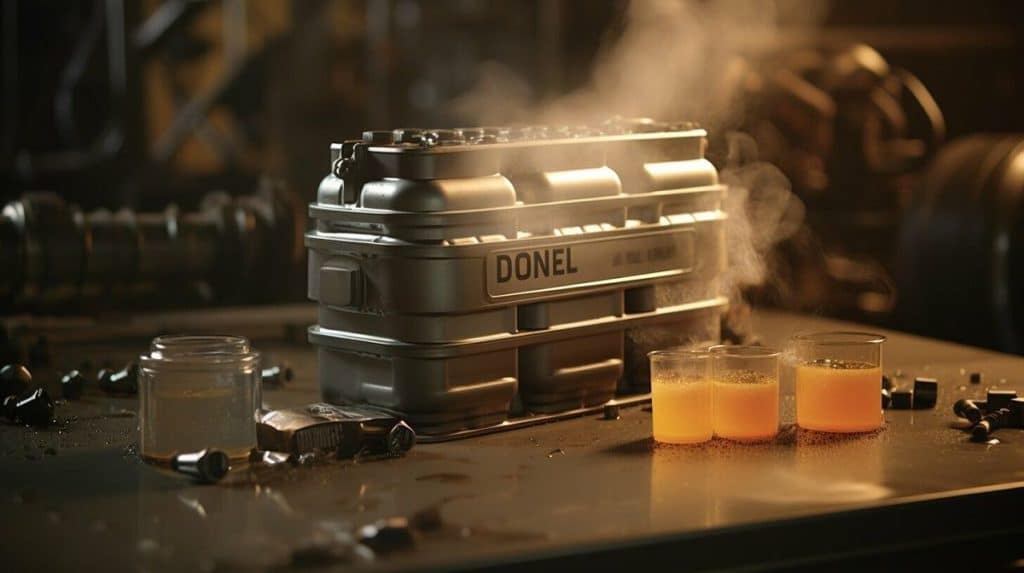Have you wondered if there is a better way to care for your diesel engine?
Being a car owner of a diesel engine, you might often feel this puzzled—if synthetic oil is better for diesel engines.
Don’t worry, you are not alone.
Let’s cut through the jargon and get straight to the heart of the matter.
Indeed, synthetic oil is the superior choice for diesel engines. Its advanced molecular structure offers unparalleled lubrication and protection. It excels under the extreme conditions that diesel engines operate in, reducing friction, enhancing fuel efficiency, and extending oil change intervals.
In the following sections, we’ll explain the basics of engine lubrication, compare synthetic and conventional oils, and make a strong case for why synthetic oil comes out on top when it comes to diesel engines.
So, get ready for a straightforward journey into the world of engine oil, where we’ll provide a clear and convincing answer to this important question.

Understanding Diesel Engine Lubrication
Diesel engine lubrication is a vital aspect of a car that should be understood thoroughly. It also directly impacts the engine’s efficiency and lifespan.
Diesel lubrication is about using good-quality oil to reduce friction, prevent wear, manage heat, and keep the engine working well.
Here is How to Understand Diesel Engine Lubrication
1. Lubrication’s Role:
- Diesel engine lubrication ensures the engine’s moving parts operate smoothly without excessive friction or heat generation.
- It prevents metal-to-metal contact between components in the engine, which can lead to premature wear and engine damage.
2. Types of Lubrication:
- Diesel engines typically use either wet-sump (oil stored inside) or dry-sump (external oil reservoir) lubrication systems.
3. Oil Circulation:
- The lubricating oil is pumped from the oil pan or reservoir to critical engine components, including the crankshaft, camshaft, pistons, and bearings.
- The oil forms a protective layer, reducing friction and dissipating heat.
4. Viscosity Matters:
- The viscosity of the engine oil is crucial. It determines the oil’s thickness and ability to flow under different temperatures.
5. Filter and Cleaning:
- Oil filters are used to remove contaminants and impurities from the oil, ensuring it remains clean and effective.
- Regular oil changes are necessary to maintain the quality of lubricating oil.
6. Cooling Function:
- In some diesel engines, the engine oil also helps with cooling by absorbing heat from the engine components and transferring it to the oil cooler.
7. Maintenance:
- Regular checks, oil changes, and filter replacements are effective lubrication.
- Engine manufacturers provide guidelines for maintenance intervals and oil specifications.
8. Synthetic Oil:
- Synthetic oil is a popular choice for better protection, efficiency, and longer change intervals.
Understanding diesel engine lubrication means knowing how vital it is for the engine, doing proper maintenance, and picking the right oil (like synthetic) for the engine to work well, last long, and perform efficiently.
Benefits of Synthetic Oil for Diesel Engine
Synthetic oil offers several benefits that are essential for diesel engines. Among them the most significant advantages is improving engine protection.
The benefits are…
- Enhanced Lubrication.
- High-Temperature Performance.
- Improved Fuel Efficiency.
- Extended Oil Change Intervals.
- Optimal Cold-Start Protection.
- Resistance to Sludge and Deposits.
Synthetic oil has a higher viscosity index, which means it maintains its viscosity under extreme temperatures and pressure, providing better lubrication for engine components.
Furthermore, its superior lubricating properties reduce friction, which can lead to improved fuel efficiency and reduced emissions with oil consumption.
Synthetic oil is also less prone to oxidation, ensuring longer intervals between oil changes, reducing maintenance costs and increasing convenience.
This makes synthetic oil ideal for use in heavy-duty diesel engines that require robust oil performance.
You can also read: How Long can Synthetic OIl Sit in an Engine?
Common Concerns of Using Synthetic oil in Diesel Engine
It’s true that synthetic oil comes with a higher upfront cost compared to conventional oil. However, it’s essential to consider the long-term perspective.
Synthetic oil’s extended life and superior protection mean fewer oil changes and reduced maintenance expenses over time. While you may pay a bit more initially, the cost-benefit analysis clearly demonstrates substantial savings down the road.
Some may worry about using synthetic oil in older diesel engines. It’s important to note that many engine manufacturers now recommend synthetic oil for older models as well. These oils meet industry standards and have been tested for compatibility.
Furthermore, manufacturers often offer warranties that cover the use of synthetic oil, providing peace of mind to diesel engine owners considering the switch.
Recommendation for Diesel Engine Maintenance
For diesel engine owners, the choice between synthetic and conventional oil depends on their priorities. If you want better engine performance and protection and your engine is compatible, synthetic oil is a good investment, even though it costs more upfront. But if you have an older or less demanding engine, conventional oil might be a more budget-friendly choice.
Remember, regular maintenance is crucial for any diesel engine. That means changing the oil regularly, swapping out filters, and cleaning the fuel system. These steps will keep your diesel engine running smoothly and efficiently for a long time.
FAQ
Q: Does synthetic oil cost more than conventional oil?
A: Yes, synthetic oil generally costs more than conventional oil. However, the benefits it provides, such as improved engine protection and performance, often justify the higher price.
Q: How often should synthetic oil be changed in a diesel engine?
A: The frequency of oil changes depends on various factors, such as the engine’s age, usage, and manufacturer’s recommendations. Generally, synthetic oil can last longer than conventional oil, allowing for extended oil change intervals.
Q: Are there any environmental benefits to using synthetic oil in diesel engines?
A: Yes, synthetic oil’s improve fuel efficiency and can reduce carbon emissions, contributing to a smaller environmental footprint. Additionally, it is formulated to produce fewer harmful byproducts during combustion.
Q: Can I switch between synthetic and conventional oil in my diesel engine without any problems?
A: Yes, you can switch between synthetic and conventional oil as needed. However, it’s recommended to stick with one type of oil for consistency unless the manufacturer suggests otherwise.
Q: What is synthetic oil, and how does it differ from conventional oil?
A: Synthetic oil is artificially created in a lab, designed to offer advanced lubrication and protection. It has a uniform molecular structure, unlike conventional oil, which is derived from crude oil and has variable-sized molecules.
Conclusion
Choosing the right oil for your diesel engine matters. Synthetic oil offers better protection, handles extreme temperatures, and can improve fuel efficiency. While it may cost more upfront, it can save you money in the long run. However, consider your engine’s age and needs. Regular maintenance, whether with synthetic or conventional oil, is key to a healthy engine.
After a thorough examination of the advantages and drawbacks of synthetic oil, it is clear that it can indeed be a better choice for diesel engines.Your choice should align with your engine’s demands and your budget for a smoother journey, however.
You can also read: What Is The Difference Between Dexron 3 And ATF+4?
Recent Posts
Advanced Tire Balancing Beads for Smooth Ride: Optimize Vehicle Performance
Smooth rides are essential for any vehicle, and tire balancing beads play a crucial role in achieving this. These tiny, yet powerful, beads ensure optimal tire performance for trucks, off-road...
Professional Paint Scratch Repair Kit for Cars: Revitalize Vehicle Aesthetics
Scratches and blemishes on your car can diminish its appearance. A professional paint scratch repair kit can help restore it. These kits are designed to...
